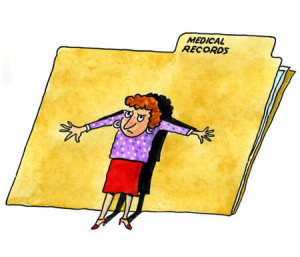Orthopedic surgeon James Dettling, M.D. specializes in shoulder and knee injuries. About half his patients are injured workers treating under a Nevada workers’ comp claim. He and long-time medical assistant, Patrick Boland, and their indispensable office manager, Diane, stopped by my office today to meet my assistants and to chat over lunch. I’ve known Dr. Dettling to give straightforward, honest opinions over the years, and I see excellent surgical results . I enjoyed having the lunch hour to ask Dr. Dettling about the problems he has treating work comp patients.
We commiserated about the increasing use of retired out-of-state orthopedic doctors hired by insurers to do peer review of treatment requests. (In Nevada, surgeons must request pre-authorization from adjusters for all non-emergency surgeries, for diagnostic tests like MRI’s, and for physical therapy.) Shoulder and knee surgeons aren’t second-guessed as much as the spinal surgeons, but Dr. Dettling noticed that he too was having to deal with denials from doctors who cite outdated treatment guidelines. For example, he told me that according to current orthopedic standards, physicians should be prescribing many more physical therapy visits than the number allowed by industrial insurers following rotator cuff repairs.
Dr. Dettling and any doctor who actually provides care has a legal doctor/patient relationship and must adhere to current and real peer treatment guidelines. Hired-gun doctors for insurers are not accountable for their judgment errors in denying treatment requests by treating doctors. Moreover, under Nevada law, an injured worker cannot sue an industrial insurer for bad faith or negligent claims administration, so it is essential that treating doctors maintain their integrity and continue to request treatment according to their best judgment, regardless of anticipated denials by the insurer. An experienced work comp attorney can deal with the denials so long as the treating doctor continues to make the requests for the best treatment.
Dr. Dettling stressed that with a surgical patient, a successful outcome does not just depend on his skills. Equally important is the expertise of the post-surgical physical therapist assigned to rehabilitate the patient. For that reason, he asks for particular therapists to work with his patients. I had not realized that, so that is something I can keep an eye on for my clients to make sure that the therapist the doctor wants is approved by the insurer.
Dr. Dettling and I agreed that the lengthy delays in obtaining necessary MRI’s and surgery approvals on comp claims cost patients more than lost wages. He is particularly frustrated when he sees a patient with a bicep tendon rupture that could have been surgically treated if the patient had been referred to him soon after the accident.
Patrick and Dr. Dettling complained about adjusters who don’t sympathize with patients who cannot drive themselves to work after shoulder surgeries. Likewise, he characterized as cruel those employers who want him to substitute a non-narcotic pain medication just so the hurt employee can report for a mindless light duty job just days after surgery.
We also talked about the power of the third-party administrators and insurers to control their provider lists. He stated that he would support a legislative change that would allow injured workers to treat with any doctor who is willing to accept what the Nevada fee schedule allows.
Diane, the office administrator, and Dr. Dettling impressed me with their knowledge of what is required to reopen a Nevada claim. They accept cash pay from former clients who need a letter from the doctor documenting a worsening of the industrial injury, and then refund the payment to the patient if the insurer reopens the claim and pays the doctor. Thank you, Dr. Dettling, Patrick and Diane for an informative luncheon.














